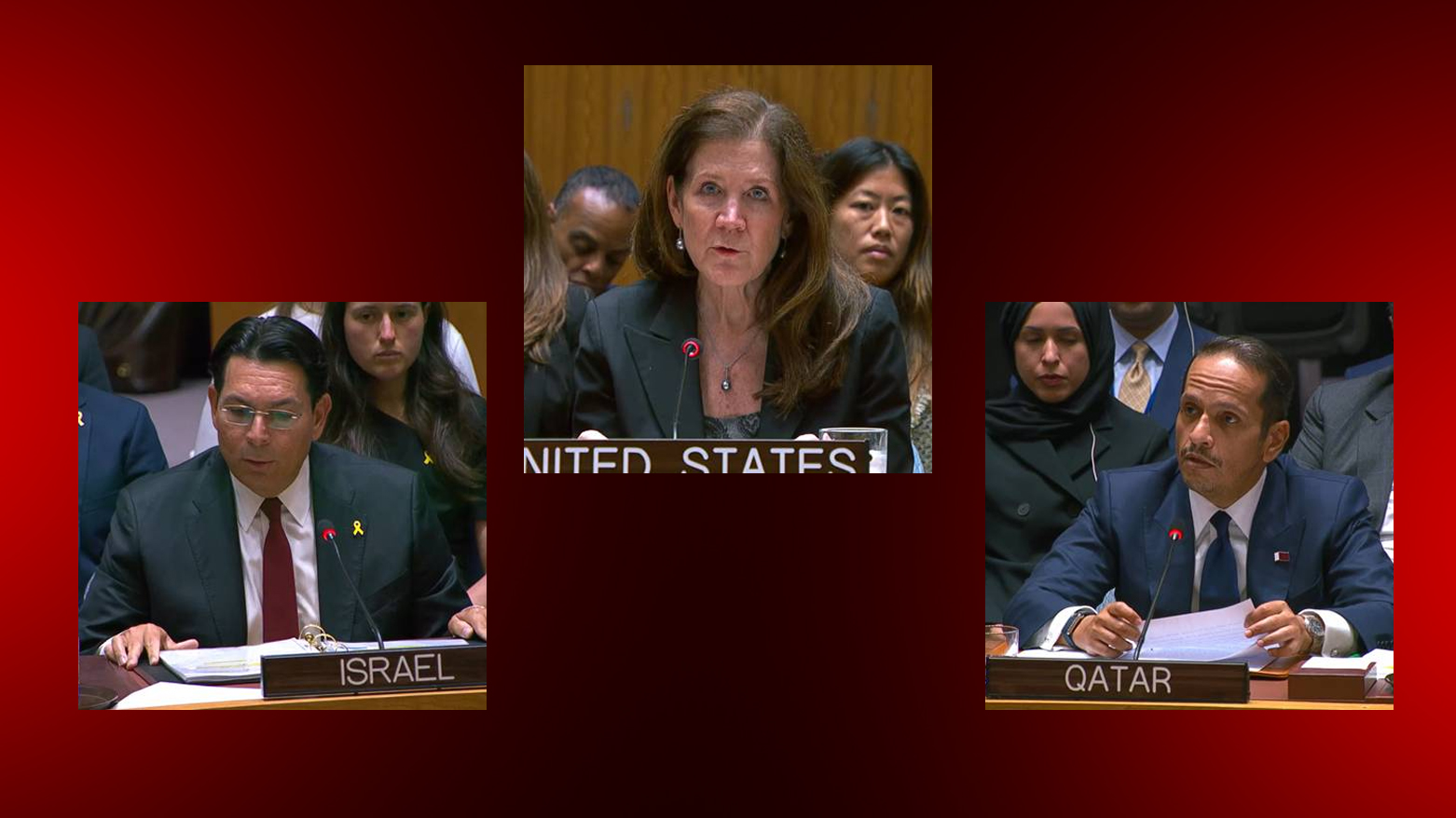Israeli Envoy Accuses Qatar of Harboring “Terrorists” as Doha Condemns Strike
Israeli envoy accuses Qatar of harboring Hamas "terrorists" at UN, defending the Doha strike. Qatar condemns the attack as a violation of sovereignty and a sabotage of peace efforts. US calls the strike "unilateral" but stops short of full condemnation.

ERBIL (Kurdistan24) – A heated exchange unfolded at the United Nations assembly after Israel’s ambassador accused Qatar of providing safe haven to Hamas leaders, following the unprecedented Israeli strike on Doha on September 9. Qatar, in response, denounced the attack as a “treacherous assault” that violated international law and jeopardized ongoing mediation efforts.
Addressing the UN Security Council, Israeli Ambassador Danny Danon defended the strike, calling it a “precise and targeted operation” against Hamas leadership. He claimed the attack eliminated figures who had “planned and directed attacks against Israel for years, many from their luxurious residences in Doha.”
“These terrorists were the sole targets,” Danon asserted, dismissing their political status. He displayed a photograph that he said showed Hamas leaders in Qatar celebrating the October 7 assault while “Israelis were fleeing gunfire, facing killing, abduction, and rape.”
Danon alleged that Hamas gunmen recently carried out a deadly shooting at a bus station, killing six people, and reminded the Council that 48 Israeli hostages remain in Hamas custody.
Israel, he said, had accepted a proposal from U.S. President Donald Trump for a ceasefire but accused Hamas of rejecting it “indifferent to the humanitarian suffering caused by their refusal.” According to Danon, the real victims were “not Hamas leaders enjoying villas in Doha, but the hostages and the civilians of Gaza used as human shields.”
“The war is not with Gaza’s civilians or the state of Qatar,” he said, “but with Hamas.” He added that Hamas leaders also find refuge in Beirut and Tehran, stressing that Israel’s strike should send a message: “There are no safe havens for terrorists—not in Gaza, not in Tehran, not in Doha. There is no immunity.”
Directing his remarks at Qatar’s prime minister, Danon declared: “Qatar must choose. Either it condemns Hamas, expels them, and brings them to justice—or Israel will do it.”
American Ambassador Dorothy Shea called the Israeli strike “unilateral” and argued that it did not serve “the goals of either Israel or the United States.” However, she stopped short of outright condemnation, emphasizing that the incident should not “be exploited to question Israel’s commitment to bringing its hostages home.”
Shea affirmed that dismantling Hamas was a “noble goal,” insisting the group and “other terrorists must have no future in Gaza.” She underscored that President Trump’s priority remained the release of all hostages, alive or dead, and an immediate end to the war.
“This can be achieved if Hamas disarms, releases the hostages, and surrenders,” she said. “But for now, Hamas continues to threaten Israel’s security and prolong the suffering deliberately.”
She suggested that, despite its “regrettable nature,” the incident could serve as “an opportunity for peace,” urging Council members not to provide Hamas with “a lifeline.” Shea reiterated that Washington had worked “tirelessly” with Qatar and Egypt in pursuit of a resolution and stressed that the peoples of the region “deserve a future filled with opportunities, free of Hamas.”
Responding at the Council, Qatari Prime Minister and Foreign Minister Sheikh Mohammed bin Abdulrahman bin Jassim Al Thani strongly condemned the Israeli strike, calling it the act of “an extremist leadership far removed from the conduct of civilized nations that believe in peace.”
He charged that Israel’s ongoing violations of international law proved that “its current leaders are intoxicated by arrogance and power, convinced of their impunity from accountability.”
The Qatari premier said the attack exposed Israel’s true intentions: to “sabotage peace efforts” and prolong Palestinian suffering. “The extremists ruling Israel today show no concern for the hostages’ lives. Otherwise, how can one explain striking Doha at the very moment negotiations were taking place on a ceasefire under the latest American proposal?” he asked.
Sheikh Mohammed urged the Security Council to fulfill its “historic responsibilities,” warning that silence in the face of aggression against a sovereign state undermines the foundations of international order and threatens the future of peace in the region.
He affirmed that Qatar would continue its humanitarian and diplomatic role but vowed not to compromise on sovereignty or security. “We reserve our legitimate right to respond through the means guaranteed under international law,” he declared.
“We in Qatar are advocates of peace, not war. We have chosen peace as our path, and warmongers will not deflect us from it,” the prime minister concluded.